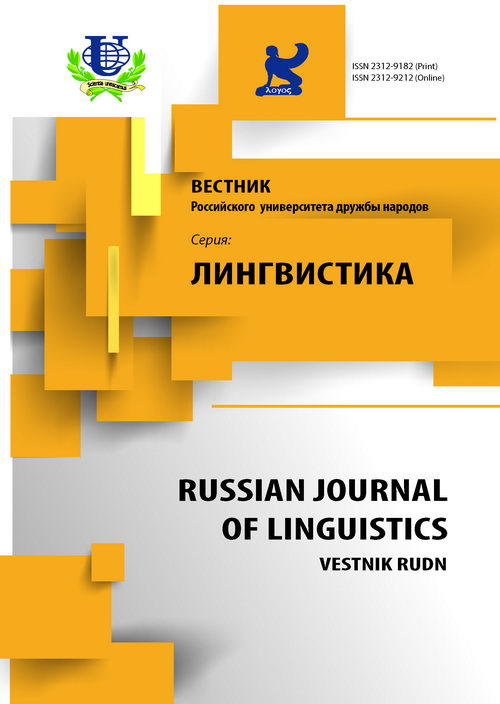No 4 (2009)
- Year: 2009
- Articles: 11
- URL: https://journals.rudn.ru/linguistics/issue/view/580
Articles
The new theory of language by N.Ya. Marr as a phenomenon of the linguistic science
Abstract
The author states a permanent reproduction of the so named «marr's myth» in russian and in a less degree in foreign linguistics to eliminate that the author insists on regarding the marr's theory as a phenomenon of historical development of the linguistics science, and hot as a pathology or a product of anybody's wicked will. The author's intention is to show the marr's theory and it's shocking faults themselves as an odd reflection of the paradigmatic revolution in linguistics in the first half of the 20 century.
Russian Journal of Linguistics. 2009;(4):5-14
 5-14
5-14


On stylistic automatization of lexical units in various types of contexts
Abstract
Stylistic automatization of lexical units in various types of contexts is investigated in this article. Following the works of Boguslav Havranek and other linguists of the Prague Linguistic School automatization is treated as a contextual narrowing of the meaning of a lexical unit to the level of its complete predictability in situational contexts and the lack of stylistic contradiction with other lexical units in speech.
Russian Journal of Linguistics. 2009;(4):15-20
 15-20
15-20


 21-27
21-27


To the question of cognitive aspect of the meaning of idioms
Abstract
In the article the meaning of idioms is analyzed with reference to the theory of frames and mental spaces. According to cognitive research, linguistic units are conceptually motivated. The idioms are in this case of great interest because of the figurativeness and relation between their actual meaning and image component.
Russian Journal of Linguistics. 2009;(4):28-32
 28-32
28-32


Expression means of futural in the newspaper text
Abstract
The article is devoted to the «futurality» means of expression in newspaper texts with economic topics. Future Tense in newspaper modifies on implicite and explicit levels. The author concludes that Future Tense in newspaper texts is expressed both by 'the nuclear' and 'peripheral' language means.
Russian Journal of Linguistics. 2009;(4):33-40
 33-40
33-40


Use fatic emotives in the intercultural communications on an example of a situation «Compliment»
Abstract
In given clause the communicative behavior of Englishmen and Russian in sphere fatic communications is considered, those language means and communicative strategy to which is preferred representatives compared Linguistic cultures come to light.
Russian Journal of Linguistics. 2009;(4):41-48
 41-48
41-48


The image-bearing basis of the feminine phraseological units of the french argot (on the material of the phraseological thematic group «Person's appearance»)
Abstract
The article deals with the argotic phraseological units which form the thematic subgroup «Feminine characteristic», being a part of the thematic group «Person's appearance». Special attention is paid to the study of the image-bearing basis of the French argotic phraseological units, used exclusively for giving an idea of women's appearance.
Russian Journal of Linguistics. 2009;(4):49-56
 49-56
49-56


 57-62
57-62


 63-68
63-68


Linguistic, psychological and methodical aspects of using argumentative phrases to render and interpret the text
Abstract
The paper entitled «Linguistic, psychological and methodical aspects of using argumentative phrases to render and interpret the text» deals with the linguistic technologies of influence, as well as the methods employed to teach them in classroom. The article gives an abound number of phrases having a pragmatic potential in argumentative articles and speeches and dwells on the necessity of their comprehensive psycholinguistic classification.
Russian Journal of Linguistics. 2009;(4):69-75
 69-75
69-75


The text and it's analysis in rhetorics, hermeneutics and philology
Abstract
The article deals with the analysis of the text in the history of philology as a broad humanitarian and properly linguistic problem. A special attention is paid to a correlation between the cultural and linguistic aspects of investigation.
Russian Journal of Linguistics. 2009;(4):76-81
 76-81
76-81
















